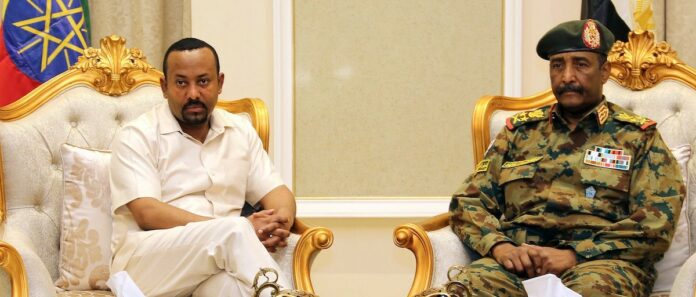What’s new? Ethiopia and Sudan are locked in a dangerous standoff over al-Fashaga, a swathe of fertile borderland from which Khartoum evicted thousands of Ethiopian farmers in December 2020. Clashes between the two countries’ troops have claimed dozens of combatant and civilian lives.
Why does it matter? Fragile political transitions in both countries are at risk if the dispute boils over. Neither side seeks war, but hostilities could escalate due to accident or miscalculation. A wider conflict could draw in regional allies and further destabilise the Horn of Africa.
What should be done? Addis Ababa and Khartoum should immediately freeze military deployments to the border area. External partners should urge the two countries to find a land-use compromise similar to a past soft border arrangement for al-Fashaga without linking this issue to other contentious matters.
I.
Overview Sudan and Ethiopia, the Horn of Africa’s two biggest countries, are facing off in a confrontation that could tip into a war neither can afford. In mid-December 2020, with Ethiopia distracted by the Tigray conflict, Sudan took control of the fertile al-Fashaga borderland, disregarding a relatively amicable land-use arrangement that had governed the area for more than a decade and evicting thousands of farmers, mainly from Ethiopia’s second-largest ethnic group, the Amhara. Infuriated by Sudan’s sudden move, Ethiopia deployed federal forces and militiamen, resulting in deadly clashes with Sudanese troops. The recurrent fighting is now raising fears of an escalation that could draw in regional allies. To prevent a disastrous border war, external partners, particularly the African Union (AU), the United Arab Emirates (UAE), the European Union (EU) and the U.S., should urge Addis Ababa and Khartoum to immediately open deconfliction channels, halt further military deployments and organise high-level talks to return to the peaceful soft border arrangement that was in place before the current crisis.
Ethiopia and Sudan have wrangled for decades over the 260 sq km al-Fashaga borderland, a region Ethiopians call the Mazega. Khartoum contends that the area, which straddles the eastern frontier of Sudan’s breadbasket Gedaref state and the western borders of Ethiopia’s Amhara and Tigray regions, officially belongs to Sudan as per colonial-era maps drawn up more than a century ago. But its boundaries were never clearly demarcated. In 2007, President Omar al-Bashir and Prime Minister Meles Zenawi – then the long-time rulers of Sudan and Ethiopia – agreed on a cooperation formula by which Ethiopian and Sudanese citizens could both cultivate the land, with the two sides agreeing to undertake formal demarcation at an unspecified later date. Leadership changes and political turbulence in both countries have sharpened old rivalries between the two neighbours and brought the al-Fashaga dispute back to the fore.
Neither side appears ready to back down, partly because both are beholden to key domestic constituencies averse to compromise. Addis Ababa enlisted Amhara forces in its military campaign against the ousted leadership of Ethiopia’s northern Tigray region. The Amhara are a key electoral constituency for Prime Minister Abiy Ahmed’s new ruling party and, in part not to jeopardise that support – and also to avoid looking weak in an election year – his administration insists that Sudanese troops withdraw from al-Fashaga before any negotiations.
Sudan’s military leaders have used the row to burnish their nationalist credentials: they want Ethiopia not only to acknowledge Sudan’s sovereignty over the area but also to accept immediate border demarcation and concurrent settlement of all major disputes between Addis Ababa and Khartoum, including over the Grand Ethiopian Renaissance Dam (GERD). In early April, Khartoum upped the ante by calling for the removal of Ethiopian troops from the UN peacekeeping mission in Abyei, on Sudan’s border with South Sudan. Sudan’s growing pressure on Addis Ababa may deepen internal fissures in Ethiopia, where Abiy’s efforts to centralise power have energised opposition among ethno-nationalists from various parts of the country.
Urgent steps are needed to steer the parties away from their perilous path. It is imperative to prevent further firefights in al-Fashaga; any escalation between Ethiopia and Sudan could even ignite a wider conflict, drawing in Egypt (in favour of Khartoum) and Eritrea (backing Addis Ababa). To this end, the AU, UAE, EU, UK and U.S. should encourage both sides to set up a channel for military dialogue in order to avoid accidental clashes that might trigger a wider conflagration. Simultaneously, they should facilitate talks between Ethiopian and Sudanese civilian and military leaders and encourage both parties to stop sending troops to al-Fashaga. These outside actors should press for a soft border solution for al-Fashaga that incorporates customary land-use rights for Ethiopian farmers in the area. Alongside the talks on boundary tensions, the AU, backed by external powers with influence over the parties, notably the UAE, should keep pushing Addis Ababa and Khartoum to engage more constructively on other divisive issues, particularly Ethiopia’s plans for the GERD.





